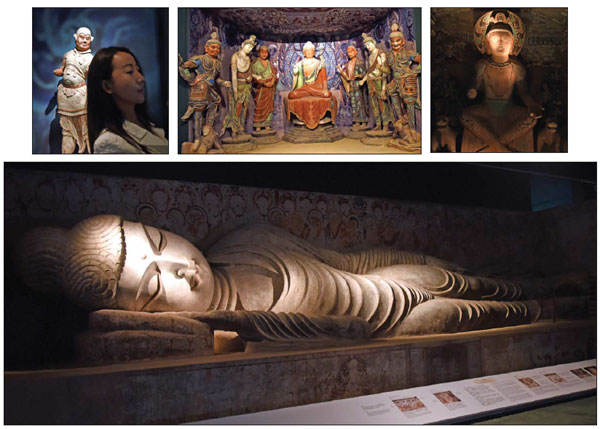A desert warrior fights to save ancient caves
Archaeologist has devoted her life to preserving priceless Buddhist grottoes
If it had not been for Fan Jinshi and her team, the world cultural heritage site at Dunhuang Mogao Grottoes in a remote Chinese desert might have long been destroyed by sand, weather or humans. Born and raised in Shanghai, Fan has spent half a century fighting an uphill battle to preserve the ancient Buddhist wall paintings at Dunhuang, in Northwest China's Gansu province.
"It was not that I favored my job over my family; I just could not bear the guilt of having our ancestors' legacy destroyed," she told Xinhua News Agency in Beijing while attending the annual session of the National Committee of the Chinese People's Political Consultative Conference.
The 1,600-year-old Dunhuang Mogao Grottoes house a huge collection of Buddhist art - more than 2,000 Buddha figures and 45,000 square meters of paintings spread among 735 caves. It is China's first UNESCO World Heritage Site.
|
Dunhuang Academy has now photographed and cataloged online all the sculptures and paintings. Sun Zifa / China Daily |
Archaeologist Fan was sent to Dunhuang after graduating from Peking University in 1963. Her college sweetheart was assigned a teaching job in Wuhan, thousands of miles away.
While in Dunhuang, a desert outpost then, Fan lived in an abandoned temple. At first, she did not even dare go out to the toilet at night.
"I saw a pair of shining eyes in the dark. I thought it was a wolf," she says. That was before she found out that the eyes belonged to a donkey.
To protect the treasures from sand and moisture, Fan and other workers put doors on the caves, planted trees and started monitoring temperature and humidity in the caves. They also control the number of visitors.
"The carbon dioxide that people exhale in the caves accumulates and will damage the paintings, so we allow a maximum of 3,000 tourists each day."
In the late 1990s, with tourism booming nationwide after national holidays were extended, the local government planned to sell shares in the Dunhuang Mogao Grottoes, but found Fan firmly in their way.
"The legacy would have been destroyed if it had been listed," she says.
Dunhuang Academy has now photographed and cataloged online all the sculptures and paintings.
"Despite our efforts to minimize damage, we can't completely stop them from being eroded. But the digital database will last."
Fan was grateful when her husband joined her in Dunhuang in 1986 after 19 years of separation. Her two sons grew up in Shanghai with their aunt.
"I have not been a good mother or wife. With regard to my family, I'm full of guilt," she says.
Fan, 79, retired two years ago as the director of Dunhuang Academy but continues her efforts as a national political adviser.
She has spent International Women's Day in Beijing for the past 25 years as the CPPCC typically convenes its annual sessions in early March.
As one of the longest-serving CPPCC members, Fan has raised many proposals for protecting China's heritage. Some have been accepted and led to changes in policy.
Fan recalls the proposal she made in 2003 that led to the establishment of the Dunhuang Tourism Information Center. The digital center opened to the public in 2014 after 11 years of research, verification, planning and construction.
"The center helps tourists have a better understanding of what we do here, and doubles our tourist capacity," says Fan.
Another proposal resulted in changes to a planned railway line, which she thought would damage the grottoes.
For the past two years she has been working on a proposal to use technology to protect sites across the country.
She proposed that the Ministry of Science and Technology prioritize cultural heritage protection, have more sites digitized, and combine traditional antique repairs with modern technology.
"Dunhuang has benefited from digital technology and I hope our experience can be replicated in the whole country," she says.
This year, Fan has decided to retire from the advisory body. "I'm too old for the CPPCC job," she says. "But I will keep on working for our heritage protection."
Xinhua

























